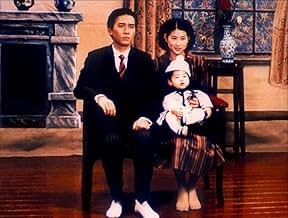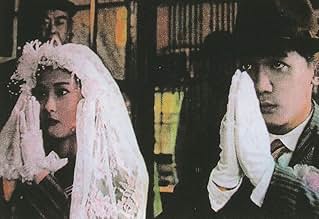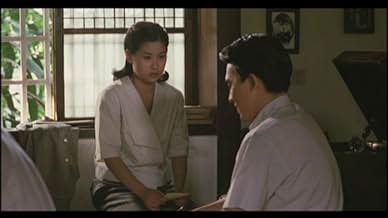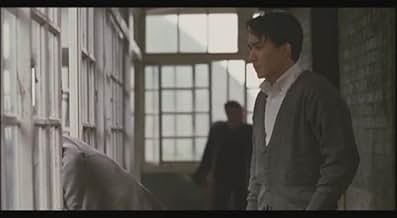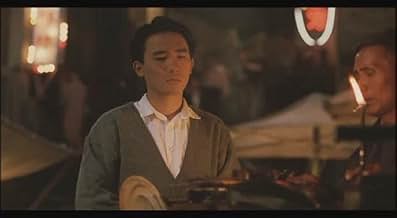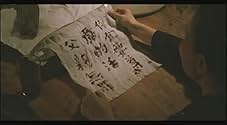IMDb-BEWERTUNG
7,8/10
6592
IHRE BEWERTUNG
Ein schöner, historischer Film, der auf dem komplexen Leben von vier Brüdern basiert.Ein schöner, historischer Film, der auf dem komplexen Leben von vier Brüdern basiert.Ein schöner, historischer Film, der auf dem komplexen Leben von vier Brüdern basiert.
- Auszeichnungen
- 8 Gewinne & 6 Nominierungen insgesamt
Tony Leung Chiu-wai
- Wen-ching
- (as Tony Chiu Wai Leung)
Tien-Lu Li
- Ah-lu
- (as Tian-Lu Li)
Empfohlene Bewertungen
Hou Hsiou-Hsien's "A City of Sadness" is one of Oriental Cinema's most rewarding challenges. I have returned to it several times, always with a sense of awe, understanding it a little more on each occasion but still not always sure what is actually happening on the screen. Although this makes the experience sometimes frustrating, the miracle is that it never detracts from the gut feeling I have had from the very first viewing that I am watching a masterpiece. An ambitious attempt to capture the immediate post second world war period of Taiwanese history by following the members of one family through fragments of their daily lives rather than a carefully constructed continuous narrative, Hou's work resonates with tremendous feeling. As is usual with this director, the audience has to work hard to supply connections in a film without joins, in order to understand who is who and what is actually going on. I have to admit that some of the scenes of gang violence still elude me, but, these apart, the light is beginning to shine through. It is clear that the old man with the beret who sits often staring vacantly is the owner of that densely furnished restaurant; that he has four sons. The eldest, the sturdy looking one, seems perennially mixed up with figures of a gangster underworld, the second has returned from the war mentally damaged, the third did not return from active service in the Phillipines and is presumed dead. And then there is the youngest who has a photographer's studio and seems completely apart from the rest of the family by virtue of a sensitive, gentle nature and the disability of complete deafness brought on by a childhood accident. It is his fortunes and those of the young nurse he eventually marries that provide the sense of audience empathy that even the most obscure cinema need in order to work its magic. Their scenes provide moments of great tenderness in a relationship that relies entirely for communication on the written note such as the occasion when she needs to tell him about the beauty of a German folksong that is being played. When the country is placed under repressive martial law with massed executions for dissenters we have snippets of the deaf mute's experiences. There is a particularly telling moment when he is in captivity, unable to hear the sound of the firing squad from which he somehow mercifully escapes. In "A City of Sadness" it is short scenes such as this that one remembers so vividly. That it provides the experience of a sweeping epic without recourse to any great scenes of action is both its mystery and fascination.
A previous poster described this film as a Taiwanese Godfather, but better. Indeed, this film has a lot similarities to godfather, in which the most notable is the condensation of an entire nation into the life of one single family. Even though I never really come to love other Hou's films, City of Sadness is a flawless epic that truthfully depict an era that is forgotten by most of my generation. I have heard those stories from my paternal grandparents, who are like people portrait in the film, grass root Taiwanese. I have also heard stories from my maternal grandparents, who are the late comers from mainland China. The entire different perspectives surprised me that in such a small nation, mistrust is still profoundly rooted and transmitted via generations. City of Sadness portraits this image so hauntingly and yet with beautiful and quiet transcendence seeing the turmoil through the eyes of the deaf and mute son of the Lin family. Taiwan, the city of sadness, is eternally sorrowful because of its rootlessness, which until today, still runs in my blood.
On the evening of February 27th, 1947 in Taipei, police ruthlessly beat a woman selling illegal cigarettes and the next day opened fire on a protest demonstration outside the Presidential Palace. Years of resentment against a government increasingly defined by nepotism, corruption, and suppression of human rights exploded in open conflict. As soon as the troops arrived, they began the systematic round up and execution of scholars, lawyers, doctors, students and local leaders of the protest movement. In total between 18,000 and 28,000 people were murdered by Chinese troops sent from the mainland by Chiang Kai-shek. Thousands of others were arrested and imprisoned and martial law was established in what became known as the "White Terror" campaign.
Hou Hsiao-hsien's magnificent 1989 film, City of Sadness, brings to light the truth about the 1947 massacre known as the 2/28 incident. Winner of the Golden Lion Award at the 1989 Venice Film Festival, City of Sadness treats one of the key issues of Taiwanese history, yet is far from being a political film. Its focus is not on the bloodshed but on the consequences for a particular family and how individual experience is impacted by the flow of time and history. In the film, Wen-heung (Chen Sown-yung), the oldest of four Lin brothers, tries to hold the family together with the support of Ah-lu (Li Ten-lu), the family patriarch. A brutish, feverishly emotional man, he has turned his Japanese bar into a family restaurant known as "Little Shanghai" but finds his business undermined by ruthless Shanghai gangsters. The second brother, Wen-sun disappeared in the Philippines and is talked about but never seen in the film.
Brother number three, Wen-leung (Jack Gao) suffered mental problems as a direct result of the war and is bedridden at a local hospital. Amazingly, he recovers enough to deal with Shanghai drug smugglers but is framed as a Japanese collaborator and, after being beaten in prison, loses his mental balance again. The fourth Lin brother, Wen-ching is deaf and runs a photography studio. Wen-ching is involved with young anti-government socialists such as his friend Hinoe (Wu Yi-fang) who is forced to flee to the mountains to join the guerillas. Wen-ching also wants to join the movement but is persuaded to stay home and care for Hinoe's sister, Hinome (Hsin Shu-fen), a nurse, who loves him.
As in all of Hou's films, there are no peak moments of dramatic interest to which everything else is simply a build up. The camera simply records the events from a distance without judgment or evaluation, allowing the complexities of the characters and situations to gradually unfold. Everything is relevant -- taking care of the baby, eating, cleaning the floor, and washing the dishes. This attention to the ordinary makes us realize that history happens to everyone, not only in the battlefield, but also in the quiet of everyday life. Far from being bogged down in banality, however, the film achieves transcendence in moments such as Hinome and Wen-ching listening to a German folk song, Wen-ching imitating the voice of an opera singer when he was only eight, the solitary flight of a bird after a sudden death, and the gentle caressing voiceover of Hinome.
City of Sadness is a remarkable portrait of one of the most traumatic events in Taiwanese history and its popularity in Taiwan reflected its willingness to deal with a previously taboo subject. Hou said, "I didn't make A City of Sadness because I purposely wanted to open up old wounds'.but because I know that we have to face ourselves and our history if we are ever to understand who we are and where we're going." Though the film was criticized by some for being "politically ambiguous" and "historically inaccurate, the film's depiction of political events and its impact on Taiwan is clear and unmistakable. City of Sadness will not satisfy those seeking a political expose, but Hou's refusal to trivialize events for the sake of emotional appeal gives the film a universality of spirit that ensures its place among the most powerful cinematic statements of our time.
Hou Hsiao-hsien's magnificent 1989 film, City of Sadness, brings to light the truth about the 1947 massacre known as the 2/28 incident. Winner of the Golden Lion Award at the 1989 Venice Film Festival, City of Sadness treats one of the key issues of Taiwanese history, yet is far from being a political film. Its focus is not on the bloodshed but on the consequences for a particular family and how individual experience is impacted by the flow of time and history. In the film, Wen-heung (Chen Sown-yung), the oldest of four Lin brothers, tries to hold the family together with the support of Ah-lu (Li Ten-lu), the family patriarch. A brutish, feverishly emotional man, he has turned his Japanese bar into a family restaurant known as "Little Shanghai" but finds his business undermined by ruthless Shanghai gangsters. The second brother, Wen-sun disappeared in the Philippines and is talked about but never seen in the film.
Brother number three, Wen-leung (Jack Gao) suffered mental problems as a direct result of the war and is bedridden at a local hospital. Amazingly, he recovers enough to deal with Shanghai drug smugglers but is framed as a Japanese collaborator and, after being beaten in prison, loses his mental balance again. The fourth Lin brother, Wen-ching is deaf and runs a photography studio. Wen-ching is involved with young anti-government socialists such as his friend Hinoe (Wu Yi-fang) who is forced to flee to the mountains to join the guerillas. Wen-ching also wants to join the movement but is persuaded to stay home and care for Hinoe's sister, Hinome (Hsin Shu-fen), a nurse, who loves him.
As in all of Hou's films, there are no peak moments of dramatic interest to which everything else is simply a build up. The camera simply records the events from a distance without judgment or evaluation, allowing the complexities of the characters and situations to gradually unfold. Everything is relevant -- taking care of the baby, eating, cleaning the floor, and washing the dishes. This attention to the ordinary makes us realize that history happens to everyone, not only in the battlefield, but also in the quiet of everyday life. Far from being bogged down in banality, however, the film achieves transcendence in moments such as Hinome and Wen-ching listening to a German folk song, Wen-ching imitating the voice of an opera singer when he was only eight, the solitary flight of a bird after a sudden death, and the gentle caressing voiceover of Hinome.
City of Sadness is a remarkable portrait of one of the most traumatic events in Taiwanese history and its popularity in Taiwan reflected its willingness to deal with a previously taboo subject. Hou said, "I didn't make A City of Sadness because I purposely wanted to open up old wounds'.but because I know that we have to face ourselves and our history if we are ever to understand who we are and where we're going." Though the film was criticized by some for being "politically ambiguous" and "historically inaccurate, the film's depiction of political events and its impact on Taiwan is clear and unmistakable. City of Sadness will not satisfy those seeking a political expose, but Hou's refusal to trivialize events for the sake of emotional appeal gives the film a universality of spirit that ensures its place among the most powerful cinematic statements of our time.
10darii73
Simply one of the best films ever made and certainly the best to have come out of China, Taiwan or Hong Kong. Forget about traumatic Taiwanese history, forget about other "epic" films from mainland China, or Taiwan, or Hong Kong. This one is one of the most profound statements about human condition and the relentless power of history. You can physically feel the winds of history blowing through a small hospital in the mountains, or a house of the person who will succumb to the inevitable, or a railway car caught in the middle of a massacre. Hou Hsiao-Hsien doesn't reconstruct history, he shows you human beings caught unawares and unable to cope with a totally unexpected avalanche of events destined to change their lives. Acting is superb, the mute character played by Tony Leung Chiu Wai (who, quite prosaically, couldn't speak Hokkien and had to be made mute) will haunt you for a very long time. One of the most underrated films from one of the most underrated directors. Spend two and a half hours of your life watching this, it's worth it. 10 out of 10.
A movie beyond its cinematic presence, but matters also the director's outlook and the audience's interpretation - in plain words, you would give it a much higher rating if someone explains you it's historical context. Surprisingly, I find Tony Leung's performance in this film decent and slightly bland, maybe because his other works are simply too good, or maybe the performance of this movie across the board is all too flawless. As the eldest son myself, I specifically appreciated the character Wen-heung, a boisterous, truculent, and rugged man, yet also interestingly a child carer, a family adhesive, and a natural leader, whose unconstrained aggression engenders one's own tragedy. Regarding the movie itself, non-linear editing, picturesque sceneries, and long, still frames generate versatile atmospheres with a unique artistry. Also a historic fiction, the film gradually unravels an era of generational trauma using convoluted storylines and symbolic characters. In times of turmoil, perhaps it would be better if we are as deaf as Wen-ching or as bewildered as Wen-leung, like yielding grass that lives through scything gales. Definitely one of the most important chinese cinematic tribute worthy of deep-dive analyses and global recognition.
Wusstest du schon
- WissenswertesIn 1989, Hou Hsiao-hsien's A City of Sadness, the first film to touch on the 228 Incident, a taboo subject in Taiwan, became a big hit in the theaters. As a result Jioufen, where the film was set, revived due to the film's popularity. The nostalgic scenery of Jioufen as seen in the film, as well as appearances in other media, charmed many people into visiting Jioufen. For the beginning of the 90s, Jioufen experienced a tourist boom that has shaped the town as a tourist attraction. Soon retro-Chinese style cafés, tea houses, and souvenir stores bearing the name "City of Sadness" were built.
- VerbindungenFeatured in When Cinema Reflects the Times: Hou Hsiao-Hsien and Edward Yang (1993)
Top-Auswahl
Melde dich zum Bewerten an und greife auf die Watchlist für personalisierte Empfehlungen zu.
- How long is A City of Sadness?Powered by Alexa
Details
Box Office
- Weltweiter Bruttoertrag
- 143.169 $
Zu dieser Seite beitragen
Bearbeitung vorschlagen oder fehlenden Inhalt hinzufügen

Oberste Lücke
What is the Spanish language plot outline for Eine Stadt der Traurigkeit (1989)?
Antwort
